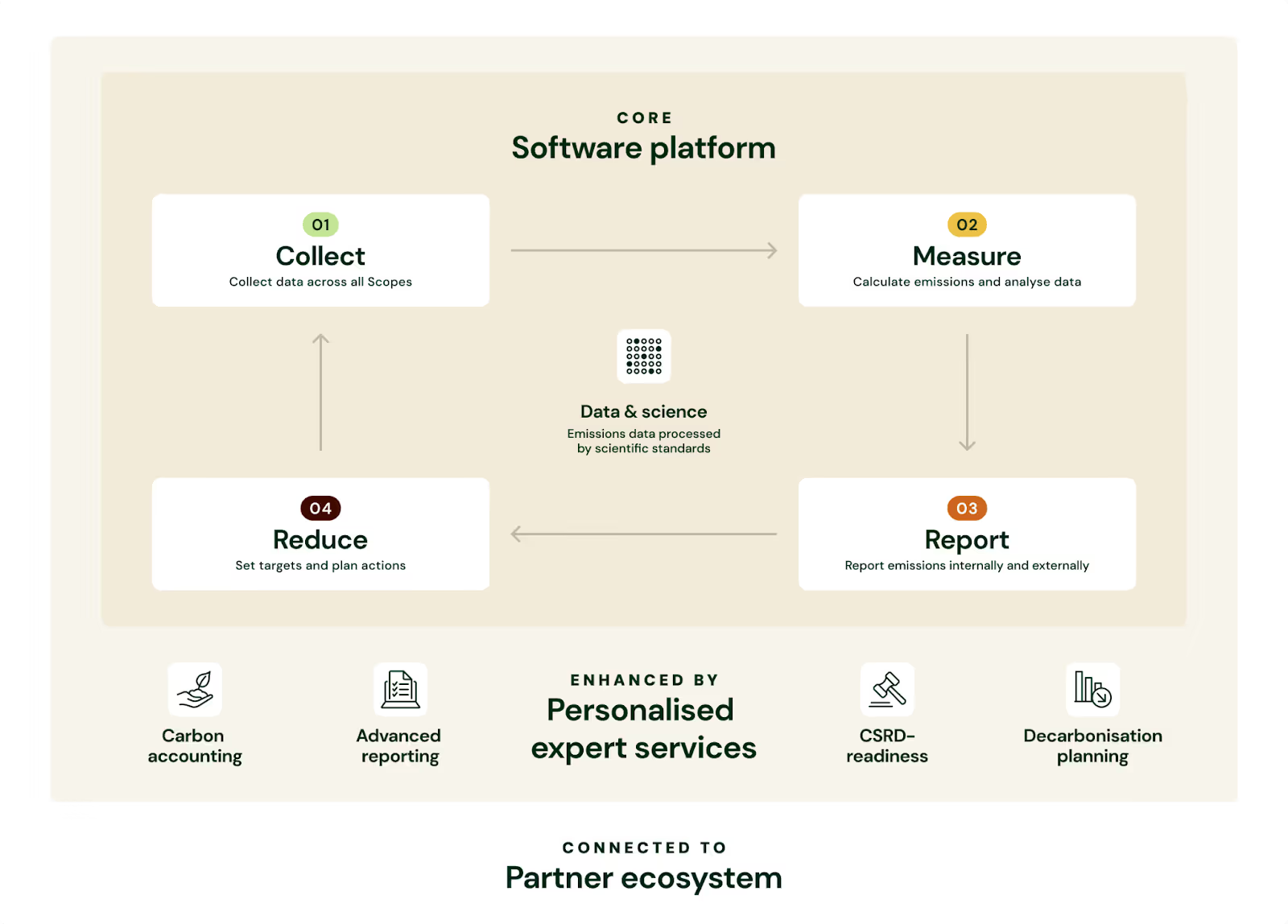Managing carbon emissions is crucial for the long-term viability of not just our planet – but also businesses, governments, and individuals. As we grapple with the realities of climate change, effective carbon management is a regulatory requirement and a vital component of sustainable growth and environmental stewardship.
Accordingly, this article acts as a guide to provide businesses with a comprehensive overview of carbon management, strategies to reduce their carbon footprint and the best practices to achieve long-term sustainability.
What is carbon management?
Carbon management involves measuring, reducing, and compensating carbon emissions to reduce environmental impact. It is a structured approach that engages all stakeholders, particularly businesses, in mitigating climate change. This approach encompasses strategies such as assessing companies' carbon footprints, reducing emissions at the source, and supporting carbon offsetting initiatives (solely for remaining emissions that could not be reduced otherwise). When implemented together, these steps can guide us towards achieving net-zero emissions.
The importance of carbon management cannot be overstated. Firstly, carbon management is critical to mitigating environmental harm as reducing carbon emissions helps to combat global warming and its associated effects. From an economic perspective, businesses that adopt strong carbon management practices often benefit from cost savings through enhanced energy efficiency and waste reduction. Moreover, adhering to regulatory requirements and aligning with international agreements like the Paris Agreement ensures that companies are well-prepared for the future regulatory landscape.
.avif)
Schedule a call to see Plan A's leading carbon management software in action.
Best practices for leading carbon management
The development of a comprehensive carbon management strategy is essential for businesses. This involves setting achievable targets, engaging stakeholders, and maintaining transparency through regular reporting. Tools such as the Carbon Disclosure Project (CDP) assist companies in disclosing their environmental impact and progress.
Listed below are a few best practices for leading carbon management:
- Reduce emissions in infrastructure and supply chain: As a first step, businesses must allocate sustainability efforts to reduce emissions within the company’s infrastructure and supply chain. At this stage, it is highly recommended that they leverage technology such as emissions measurement tooling and innovative reduction technologies to enhance carbon management. For example, Microsoft aims to be carbon-negative by 2030 by cutting its emissions by 50% and removing the rest through high-quality carbon removal solutions.
- Invest in verified carbon offsets: Prioritising the decarbonisation of operations is essential. However, businesses can also invest in carbon offsets such as tree planting and direct air capture to account for emissions that cannot be reduced. These offsets can significantly reduce atmospheric CO2 levels, yet ensuring that offsets are rigorously vetted to genuinely cut emissions or remove carbon is crucial.
- Influence policy for decarbonisation: Businesses must stay informed about and comply with local and international regulations. To prepare for future regulatory requirements, it is critical to align strategies with global frameworks such as the Paris Agreement and the Intergovernmental Panel on Climate Change (IPCC). Meanwhile, lobbying for supportive policies can help create a stable environment for decarbonisation.
The vital role of decarbonisation within carbon management
Decarbonisation must be the central focus of any carbon management strategy, involving reducing current emissions and investing in technologies and practices that remove CO2 from the atmosphere. Accurately assessing and measuring carbon emissions are the initial steps in any effective carbon management plan.
Tools and methodologies such as Life Cycle Assessment (LCA) are vital for comprehending the environmental impacts of all stages of a product’s life. It helps businesses identify opportunities to reduce emissions at each stage, fostering a comprehensive approach to sustainability. Once emissions are accurately measured, implementing reduction actions is crucial. Effective strategies include enhancing energy efficiency, transitioning to renewable energy sources, promoting sustainable transportation, and improving waste management.
When some emissions cannot be reduced, carbon offsetting and sequestration provide viable solutions. Carbon offsets involve investing in projects that reduce emissions elsewhere, such as renewable energy projects or reforestation initiatives. Sequestration includes natural and technological methods of capturing and storing carbon, like afforestation, soil management, and carbon capture and storage (CCS) technologies. Organisations that invest in these strategies and subtract more CO2 than they produce can achieve “climate-positive” operations, significantly benefiting the environment and advancing long-term sustainability.
How can companies leverage carbon management software?
Effective carbon management is essential for sustainable development and environmental protection. Carbon management software is a powerful tool for businesses to measure, track, and manage their carbon footprint. Plan A's leading carbon management solution empowers businesses to measure, mitigate, and report their carbon footprint, ensuring a holistic approach to sustainability.
By leveraging Plan A’s advanced tools, companies can efficiently track and reduce GHG emissions, comply with ESG regulations, and transparently share their progress with internal and external stakeholders – paving the way to net zero emissions.
Below is an overview of 6 key areas to leverage carbon management software to ensure seamless sustainability management:
Easily collect data across your entire value chain

Credit: Plan A
Measure your emissions accurately and frequently

Credit: Plan A
Report your emissions and master your CSRD journey

Credit: Plan A
Set decarbonisation targets using expert guidance

Credit: Plan A
Leverage tailored reduction levers to decarbonise your operations

Credit: Plan A
Monitor progress to improve your decarbonisation strategy

Interested in learning more about the role of software in carbon management? Read Plan A’s comprehensive guide to emissions management software in 2024.
As businesses allocate their resources toward regulatory compliance and gaining a competitive edge, implementing a carbon management strategy is vital. Meanwhile, companies that choose to leverage innovative technologies to bolster their carbon management can effectively manage and reduce their environmental impact.
Emissions management software offers businesses end-to-end capabilities such as detailed carbon accounting, strategic decarbonisation planning, and even advanced reporting features. Together, such features ultimately enable organisations to accurately track, manage, and reduce their emissions, ensuring they comply with regulatory requirements and undergo sustainable growth.
Schedule a call to see Plan A’s Carbon Management Platform in action and learn how sustainability can give your business a competitive edge.




.jpg)



